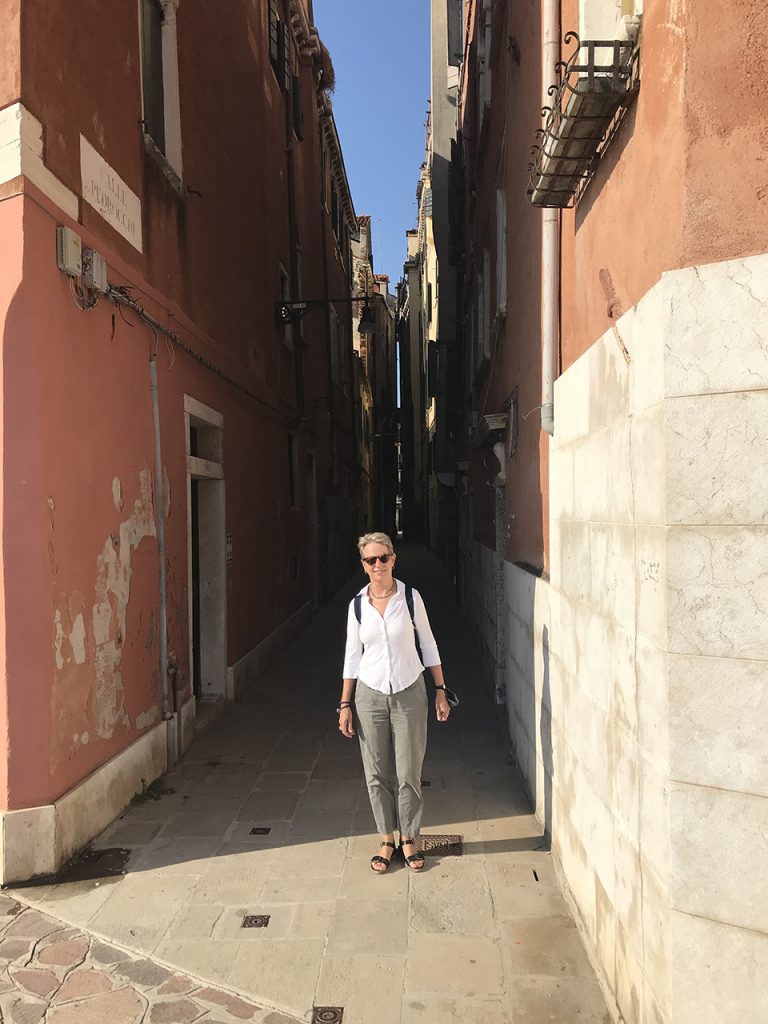
An Adelphi novelist uses her retirement to probe the complications of money and boredom.

For Martha Cooley, award-winning author, essayist, translator and professor emerita of English, retirement has been a fruitful subject of intellectual exploration. In 2021, Cooley left Adelphi after 15 years of teaching and moved to Castiglione del Terziere, Italy.
“It’s really a dislocating of self,” she said. “You’re removing yourself from a professional life you’ve had for decades and, in my case, moving halfway around the world.” As Cooley settles into retirement and what she calls its “possible ranges of significance,” she’s found herself as curious as she is uncertain. That tension has wound its way into her recent writing projects: a novel, Buy Me Love, and an essay, “On the Uses of Boredom: Philosophical, Scientific, Literary.”
Buy Me Love, published by Red Hen Press in 2021,1 is Cooley’s third novel, following The Archivist, a national bestseller also published in a dozen foreign markets, and Thirty-Three Swoons. The book’s protagonist is Ellen Portinari, a 52-year-old freelance editor living in Brooklyn who learns she’s bought a winning $100 million lottery ticket. Ellen is less jubilant about the discovery than readers might expect. “I wasn’t interested in writing about the material gains of a jackpot win,” Cooley said. “I wanted to lay out questions that would activate Ellen’s need to decide what matters to her. The ticket acts as a door opening to something that she felt was previously unavailable to her.” Given 30 days to redeem the ticket, Ellen struggles to reckon with the implications of her big win. Her thoughts divert quickly to how the money might help her brother, a genius composer and alcoholic whose girlfriend died in a terrorist act overseas. She also becomes involved with a local man and his son, and her path crosses with that of a street artist named Blair, whose life operates on a similar axis of precarity. As the clock ticks, Ellen seeks to reconcile thrill, anxiety and ambivalence.
“The image that came to me early on,” Cooley said, “was a swing seat of happiness, constantly rocking back and forth. I was fixated on this idea of something utterly unexpected happening, a curveball that would rearrange Ellen’s understanding of herself and open up new possibilities.”
In “On the Uses of Boredom: Philosophical, Scientific, Literary,” which appeared on LitHub on January 13, 2021, Cooley writes of another swinging pendulum of experience. The essay opens with a years-old memory: slipping and falling off a slick stone ramp. While Cooley escaped with only cuts, bruises and a chipped tooth, the fall stayed with her both as a strange suspension of time and as a memory of a near-brush with death. That “fleeting-yet-endless sensation” raised questions about the experience of boredom.
In her essay, Cooley situates her meditations on boredom alongside the writings of prominent thinkers, from Seneca to Jean-Paul Sartre, Søren Kierkegaard and David Foster Wallace. “Boredom is laced with dread,” Cooley writes, even though “our brains [also]need boredom, as it happens.” She recalled one creative writing class session at Adelphi, where she asked students to stare at an abstract painting of the Brooklyn Bridge for five minutes. The students confessed afterward that the exercise made them feel tense and uneasy, which Cooley saw as a common symptom of boredom, particularly during the COVID-19 pandemic.
“For those of us who had the luxury of staying home, we’ve had to reassess our notions of boredom. What does it mean when we’re bored or ‘doing nothing’? How does that intersect with our anxieties?” She pointed out that boredom also performs the critical duty of allowing our brains to file important mental paperwork.
“Across human cultures, there have always been spaces for resting, retreating, reconsolidating your identity,” Cooley noted. Just like Ellen in Buy MeLove, we can only outrun the basic questions of our existence for so long. Boredom alerts us to this fact. “You can try to tamp down boredom by consuming things and people and experiences, “she said, “but ultimately you’ll have to confront who you really are, what you really want and from where you’re deriving meaning.”
1 Cooley, Martha. Buy Me Love. Red Hen Press, 2021.